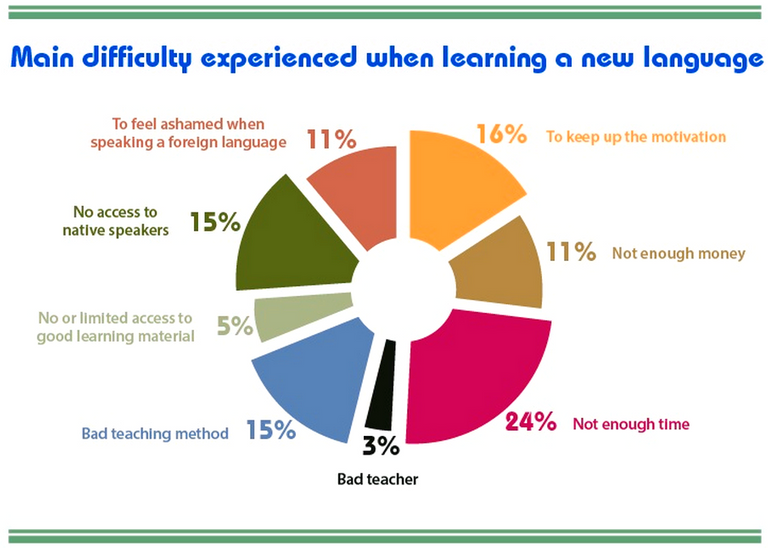
After too much time (2 weeks not publishing and not commenting as much as I wanted to, because of several personal reasons) I'm back here on Steemit with a post about how to learn a new language.
You already know, if you have read my introductory post that I am a translator. Now, all translators need to know well at least one language, but most know one well and one "decently" well (or even better, both of those well). And most translate from their first foreign language (the one they do know well) to their native language.
In my case, I tend to translate mainly from Spanish to Italian (I'm from Italy) because I am more confident in Spanish than I am in English (above all in the spoken form).
Anyway, this post is not about translation and translator, but about language.
I want to give you all some tips (used also by translators) to learn a new language[1]:
- Make mistakes

It's unavoidable, we all make mistakes, so why wouldn't you? Mistakes are what teaches you the best. So don't be afraid of making mistakes, just go ahead and talk, there are just two possibilities: you say what you intend to say in the right way or you make a mistake, and both are good (very good!) options :)
If you make a mistake, you're teacher, or a friend, or someone else, will correct you, if you don't, you got it right, keep going!
- Find what motivates you

As you go on and on with the learning process, it might be sometimes hard to keep the motivation up. It happened to me too when I started learning Swedish (I never ended, wasn't motivated enough). A research showed this is the second highest difficulty for people who try to learn a new language[2]. So, how do you keep it up? Well, you need to have it clear since before you start.
When you're starting to learn a new language set the language you want to learn, why you want to learn it, for what, in what will it help you, what will be the benefits for you, what do you need to do to get it accomplished (how many classes per week, at what times, what you'll need to miss), and compromise.
Do you really want to learn Spanish? Then you'll have to take lessons twice a week with that professor you don't like so much but who's good at what he does, and the lessons might coincide with your pal's birthday or with a girls/boys night out. Only this way you will be able to go to Mexico, Guatemala, Peru, Argentina and all South America and Central America and have lots of fun while traveling, meeting people and maybe even finding work there. Deal done?
- Time is not a problem

In that same research I mentioned before, time was the most mentioned "difficulty" by the respondents. Why? Why should time be a problem? We all have 24 hours, like Bill Gates, Elon Musk and Mark Zuckerberg. If they were able to build what they built... why can't you learn Spanish? You can't get a bus or a taxi and get to Instituto Cervantes twice a week because you're going after pokémons? Really?
- Pick a good teacher

This is critical. If you decide you'll go to a school, you should probably be ok, but if you're going to take private lessons: pick someone you trust. You'll notice if he's good or not during the lessons, if he's not he should be honest with you (if he's your friend, even more) and tell you he's not able to do that, and just suggest you someone else.
- Practice, practice, practice
Practice isn't the thing you do once you're good. It's the thing you do that makes you good.
Malcolm Gladwell
This is the most important part. Now you're motivated, you have already made some mistakes, you kept going and going, improved your level, your teacher is good and you trust him. You just need... practice. Practice, practice, practice with everybody you can at any moment you can. When you're going to any shop, prepare the list in the language you're learning (in our example, Spanish), and look for the stuff you need to buy, force your mind to think in that language, practice! Look for natives in that language, there are many communities online (I'll make another post about this, should publish it tomorrow). PRACTICE.
Bonus: these are the results from the research, conducted by EuroTalk, mentioned in the post:

(here's the full article)
Do not use them as excuses, it's just to complete the post and so you can satisfy your curiosity. YOU HAVE NO EXCUSES NOW!
Note: All images found on internet, credits to the owners (unknown)
[1]All these work better with a teacher. They do work for self-learners too, but I'm going to prepare a separate post for self-learners, mainly on what to focus first, what to keep last and that kind of tips (in general, but if you'd like any particular language, please just let me know).
[2]16% of the answers, the top difficulty reported was they "did not have enough time", 24% of the preferences.
I upvoted You
https://steemit.com/education/@llange/what-s-the-best-international-language-to-learn
Nice post!
I learned english basically by myself and it took years but it was worth spending all that time :)
Thanks :)
I started learning English when I was almost a baby (I was just 10), I loved it. But I started with private lessons, then went to school and had a teacher since then. After I graduated (some years later) I kept studying by myself.
The story was similar with French and Spanish, but starting in different moments of my life. I guess I've always liked languages, maybe I had to become a translator?
:D
Shot you an Upvote and followed you :)Nice @sharingtheworld ! This is also why i am speaking 6 languages now :)
What do you think of VR as a potential learning platform?
https://steemit.com/vr/@astralship/is-language-learning-a-killer-app-for-vr
Shot you an Upvote :)Nice @sharingtheworld